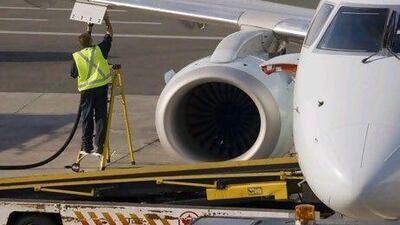Falling oil prices are helping to reduce the cost of air travel, although the lower fares could be short-lived as the peak summer travel season approaches.
With the price of crude falling below the symbolic $100 a barrel on the New York Mercantile Exchange, Emirates Airline declared last week it would remove fuel surcharges across its international network.
"We promised our customers from the outset that we would eliminate the surcharge as soon as it was commercially viable and this has now been done," said Tim Clark, the president of Emirates.
The elimination of the surcharge was likely to lower fares by an average of Dh300 (US$81) to Dh400 a ticket, travel agents said.
As of last week, jet fuel was $127 a barrel, down 11 per cent from the week before but 40 per cent higher than a year ago, according to the International Air Transport Association.
While Emirates stands alone in waiving its fuel surcharge amid still volatile commodity prices, it may have company before long.
"I am sure the rest of the airlines will follow suit," said Premjit Bangara, the travel manager at Sharaf Travel in Dubai. "Everyone uses Emirates as a benchmark."
Other airlines have introduced promotional fares for certain destinations to encourage discretionary bookings prior to the summer season.
Last Sunday, Etihad Airways cut fares for certain flights up to 40 per cent for this month, saying the move was "designed to help all our UAE-based customers choose their perfect holiday or short break".
The discounts should boost business on some routes in the region on which demand had fallen because of political unrest, said Jim el Murr, the general manager of Salem Travel Agency in Abu Dhabi.
"Many GCC travellers are still cautious because of what is happening around the Middle East," Mr el Murr said.
Sales such as Etihad's are "short-term promotions" used to boost business on certain underperforming markets prior to the summer season, Mr Bangara said.
During peak season, airlines raise prices in line with demand, he said.
"The market really picks up quickly in June, July and August," Mr Bangara said, adding the GCC was a "last-minute market" in which many bookings were made in the days prior to a trip.
"The market is more settled and the feeling of uneasiness is not there any more," he said. "And the corporate travel is coming back in business class."
Estimates from the US suggest that because of higher fuel prices and growing demand for air travel, fares this summer could rise as much as 15 per cent over last summer, reaching levels not seen since before the global downturn.
"At the end of the day, airlines are trying to keep pace with the rising cost of doing business," Steve Lott, a spokesman for the Air Transport Association of America, told the Los Angeles Times.
This year's expected demand should eclipse that of the past few summers, when the global economic downturn or the H1N1 influenza pandemic dampened demand for foreign vacations among GCC residents.
The most popular summer destinations for GCC families were Malaysia, Thailand, the UK, Turkey, Germany and Austria, Mr el Murr said.
The Gold Coast in Australia was a popular holiday destination for families able to spend several weeks abroad, he said.
Some of the most competitive ticket prices, travel agents say, are on airlines that offer indirect service from the UAE, such as flights to Europe or Asia with connections in Manama or Doha on Gulf Air or Qatar Airways.

